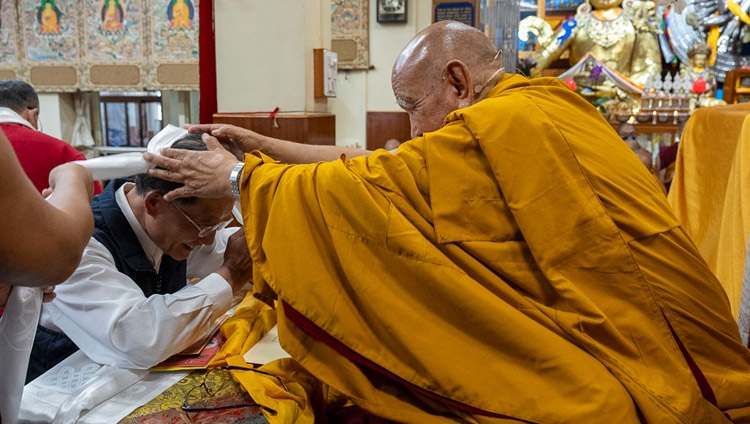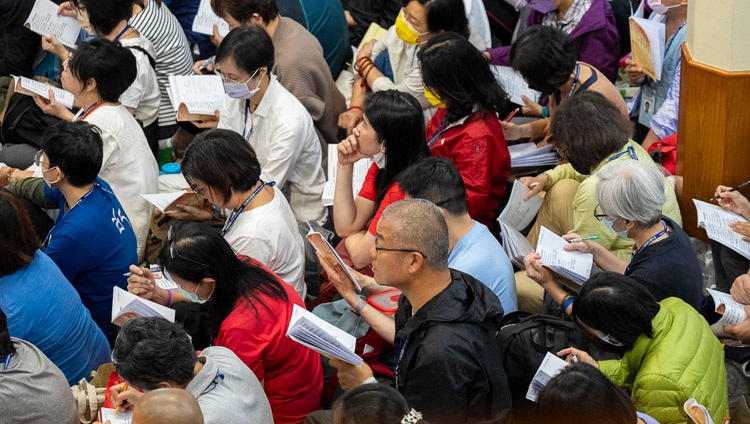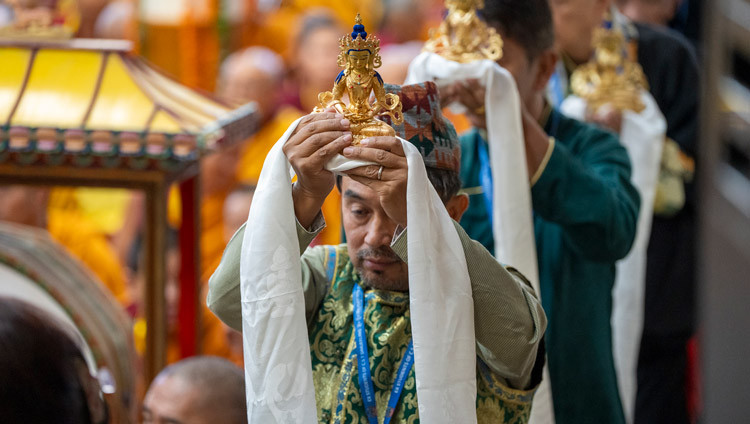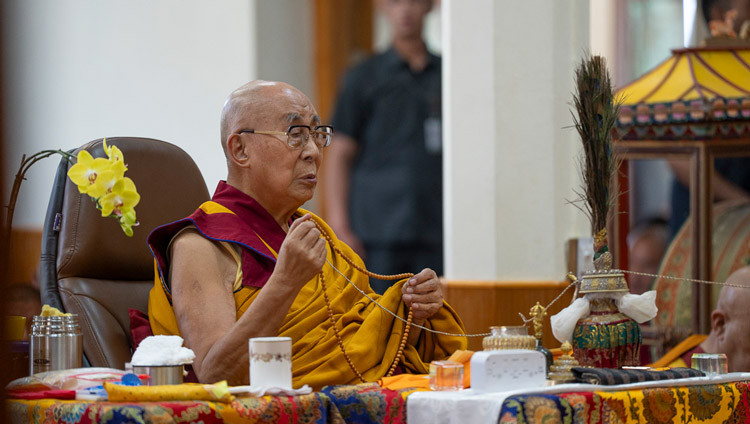Teachings for Taiwanese 2023 – First Day
Thekchen Chöling, Dharamsala, HP, India, – Yesterday it was announced that, because he has a persistent cold, His Holiness the Dalai Lama’s physicians had advised that should rest today and tomorrow. Consequently, the Gaden Tri Rinpoché was requested to begin the scheduled teachings requested by Taiwanese students.

A representative of one of the groups from Taiwan presenting traditional offerings to Gaden Tri Rinpoché at the start of teachings at the Main Tibetan Temple in Dharamsala, HP, India on October 2, 2023. Photo by Tenzin Choejor
This morning, Tri Rinpoché duly took his place on the throne in the Tsuglagkhang, the Main Tibetan Temple in Dharamsala. The ‘Heart Sutra’ was recited in Chinese, following which representatives of the various groups of students offered Tri Rinpoché symbols of the body, speech and mind of the Buddha.
At the beginning of his discourse, he recited the verses of salutation from Nagarjuna’s ‘Fundamental Wisdom of the Middle Way’.
I prostrate to the perfect Buddha,
The best of all teachers, who taught that
That which is dependent origination is
Without cessation, without arising;
Without annihilation, without permanence;
Without coming; without going;
Without distinction, without identity
And peaceful – free from fabrications.
Tri Rinpoché first mentioned the importance of having a correct motivation in the beginning and end of whatever you do. At the outset of any Dharma practice we should have a wish to benefit others, and at the end we should dedicate the merit.
“On this occasion,” he advised, “when we have a precious human life and the opportunity practise the Dharma, we need to think of doing so to free all mother sentient beings from suffering. We need to listen to the teachings, reflect on what we’ve heard and meditate on what we’ve understood.
“Today I’m going to teach from a short text by Jé Tsongkhapa called ‘Song of Experience — the Concise Stages of the Path to Enlightenment’ which conveys the entire path taught by the Buddha. To begin with it’s good to appreciate the authenticity of the teaching in relation to the greatness of its authors. The teachings included in this text originated from the Buddha Shakyamuni and were passed down by great Indian and Tibetan masters to Jé Tsongkhapa, an emanation of Manjushri, who compiled them in this work. Tsongkhapa composed a ‘Great Treatise on the Stages of the Path to Enlightenment,’ an ‘Intermediate Treatise’ and a ‘Concise Treatise.’

Gaden Tri Rinpoché addressing the congregation on the first day of teachings requested by Taiwanese at the Main Tibetan Temple in Dharamsala, HP, India on October 2, 2023. Photo by Tenzin Choejor
“The text opens with a homage to the greatest of the Shakyas, whose body is formed by ten million perfect virtues, whose speech fulfils the hopes of limitless beings, and whose mind perceives everything as it is. It goes on to pay homage to Manjushri and Maitreya from whom flowed the streams of teachings respectively expounding the profound view and the extensive deeds of a Bodhisattva. Respect is also paid to Nagarjuna and Asanga.
“Next respect is paid to Dipankara Atisha who summarized without error all the main points of the paths of the profound view and extensive conduct.
“With regard to the greatness and quality of the teaching itself, first of all it is not contradictory. Because of its quality every scriptural pronouncement without exception will dawn on our minds as personal instructions. Thirdly, it makes it easy to understand what the Buddha intended and finally it protects us from the great error of turning away from the teaching.
“The wise ones of India and Tibet relied on this teaching, who with intelligence would not be drawn to these stages of the path of the three kinds of persons. Teaching or listening to this teaching once is equivalent to summarizing the whole of the Buddha’s teaching.”
Tri Rinpoché remarked that the verses thus far indicate the greatness of the teaching. Next, with regard to the way to engage in its practice, the text explains the importance of relying on a qualified spiritual master. It clarifies how to rely properly in thought and deed on the fine spiritual friends who show us the path.
From this point on Tsongkhapa gives weight to his advice by repeating a refrain that some translate as follows: ‘This is what my revered and holy teacher did, and I, who seek liberation, will do likewise.’ Others render it as follows: ‘I, a yogi, practised in this way; you, who aspire for liberation too, should do likewise.’
The text next advises us to reflect on the preciousness of human life and how it is hard to obtain. It is described as easily lost and brief as lightning in the sky. To collect its causes, we must observe morality and cultivate other practices based on that. Compared to this, worldly actions are like chaff in the wind. We must make best use of this life, day and night. This completes the instruction that concerns persons of fundamental capacity.

Members of the audience from Taiwan sitting inside the Main Tibetan Temple listening to Gaden Tri Rinpoché in Dharamsala, HP, India on October 2, 2023. Photo by Tenzin Choejor
The text goes on, when you die, you can’t be certain not to take a bad rebirth. Only the Three Jewels grant sure protection from such fears. Therefore, we must make our practice of refuge steadfast. We must reflect on faults of negative actions and the qualities of virtue.
Since there won’t be swift progress towards the highest path, unless we gain a life with all prerequisite features, we must train ourselves to create the causes, so that none are lacking. With care we must apply all four counteractions—regret, reliance, remedy and resolve.
Tri Rinpoché cited a verse from the ‘Offering to the Spiritual Master’ (Lama Chöpa):
Afraid as I am of the searing blaze of suffering in the lower realms,
Inspire me to take heartfelt refuge in the Three Jewels
To strive fervently to avoid unwholesome deeds
And accomplish all collections of virtue.
A real aspiration for freedom will not arise without effort to consider the drawbacks of true suffering. Unless we think of its sources, we won’t know how to sever its root. Tri Rinpoché remarked that when we are thirsty, we seek water, similarly it is only when we see how we are bound in the cycle of existence that we will seek real freedom from it. This concludes the instruction for persons of intermediate capacity.
Tri Rinpoché explained how important it is to understand the Four Noble Truths and how taking refuge in the Three Jewels, the Buddha, Dharma and Sangha, is a Buddhist practice. Not only does reflection on suffering we experience prompt us to develop a determination to be free, it also becomes the basis for developing compassion for other suffering sentient beings.
The mainstay of the supreme vehicle is the awakening mind of bodhichitta. It is like an elixir that turns the two stores of merit and wisdom into gold. Knowing this, heroic Bodhisattvas make this precious and supreme attitude their quintessential practice. We will only be able to really help others by attaining Buddhahood ourselves.
‘Entering into the Bodhisattva Way’ distinguishes between the wish to go and actually going. The aspiring awakening mind is like the wish to go, whereas the engaging awakening mind is like taking the steps to go. If merely wishing to help sentient beings is more valuable that making offerings to the Buddhas, where is the need to say anything more about engaging the awakening mind. If merely giving food to a few beings is regarded as virtue, what need be said about seeking to benefit beings infinitely.

Gaden Tri Rinpoché walking through the Main Tibetan Temple courtyard as he departs at the end of the first day of teachings requested by Taiwanese in Dharamsala, HP, India on October 2, 2023. Photo by Tenzin Choejor
Tri Rinpoché advised that we should reflect on bodhichitta and its benefits three times during the day and three times at night. He noted that those who practise Highest Yoga Tantra do this when they recite the Six Session Guru Yoga. He concluded for the day by referring to the qualities of bodhichitta disclosed in ‘Entering into the Bodhisattva Way’:
Bodhichitta is the elixir of life, born to end death in the world. It is the inexhaustible treasure, alleviating poverty in the world. 3/28
It is the supreme medicine, curing the sickness of the world, a tree of shelter for weary creatures staggering along the road of existence; 3/29
The causeway to cross over bad rebirths, open to all who travel; it is the rising moon of the mind, mitigating the defilements of the world; 3/30
It is the brilliant sun, dispelling the mist of ignorance from the world. It is the fresh butter risen up from churning the milk of the true Dharma. 3/31




